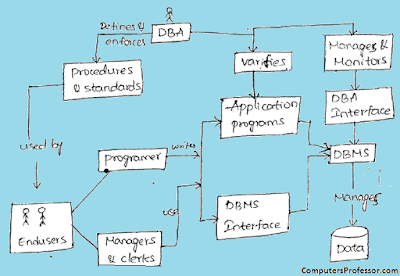How to say Data Base Environment is a Human Component (OR) explain DBA Managerial role & Technical role ?

https://www.computersprofessor.com/2016/08/how-to-say-data-base-environment-is.html
Data base system can not operate
without the human component.
|
Effective data
administration requires both technical and managerial skills.
|
DA & DBA direct and
control personal staffing and training within their respective departments.
|
DA also set data
administration goals.
|
Data Sharability &
time availability.
Data consistency &
integrity.
|
The DA is responsible for
providing a global & comprehensive administrative strategy for all of the
organizations data.
|
Data security &
privacy.
Data quality standards.
Extent & type of data
use.
|
DA &
DBA activities:
DA
|
DBA
|
Strategic planning
|
Controls & supervises
|
sets long–term goals
|
Executes plans to
reach goals.
|
Sets policies &
standards
|
Enforces , policies
& procedures
|
Is broad in scope
|
Narrow in scope
|
Focus on long term
|
Focus on short term
|
Has a managerial
orientation
|
Has a technical
orientation.
|
Is DBMS – Independent
|
Is DBMS– specific
|
|

|
DBA
Activities:
|
|
The DBA skills can be divided in to
2 categories.
- Managerial
- Technical
|
Managerial
|
Technical
|
|
®Broad business understanding
|
®Broad data processing back ground
|
|
®co-ordination skills
|
®System development life cycle
knowledge
|
|
®Analytical skills
|
®Structured methodologies
- Data
flow diagrams
- Structure
charts
- Programming
languages
|
|
®conflict resolution skills
|
®Data base life cycle knowledge
|
|
®communication skills
|
®Data base modeling & design
skills
Conceptual
Logical
Physical
|
|
®Negotiation skills
|
®operational skills.
Database implementation, data
dictionary management, security and so on.
|
|
|
DBA Managerial Roles :
|
|
®As a manager, DBA must concentrate
on the control & planning dimensions of data base administration.
|
|
®Coordinating, monitoring and
allocating data base administration resources: people and data.
|
|
®Defining goals & plans for data
base administration function.
|
|
DBA Activities & Services :
|
|
End user support :DBA
interacts with the end user by providing information & data because end
users have dissimilar computer backgrounds . End ® user support services include:
|
|
1. Gathering user requirements :
The DBA ‘s communication skills
are very important at this stage because DBA gathering of user requirements
& provide solutions.
|
|
2. Building End –user confidence:
Finding solutions to end
user’s problems, increase end user trust & confidence in DBA function.
The DBA function is provided & how those services enhance also to educate
the end user in the services.
|
|
3. Resolving conflicts and problems :
Finding solutions to end users
problems in one department might trigger conflicts with other departments.
®When data conflicts arise the DBA
function has the authority and responsibility to resolve them.
|
|
4. Finding solutions to information needs :
The ability and authority resolve
data , conflicts enables the DBA to develop solutions that will properly fit
within the existing data management framework. The DBA’s primary objective is
to provide solutions to the end users information needs.
|
|
5.Ensuring quality & integrity of data & applications :
once the right solution has been found it must be properly implemented and
used. The DBA must also make sure that the data base transactions do not
affect the quality of the data.
|
|
6. Managing the training and support of DBMA users:
one of
the most time consuming DBA activities is teaching end users how to use the
data base properly. The DBA coordinates & monitors all activities concerning
end user education.
|
|


